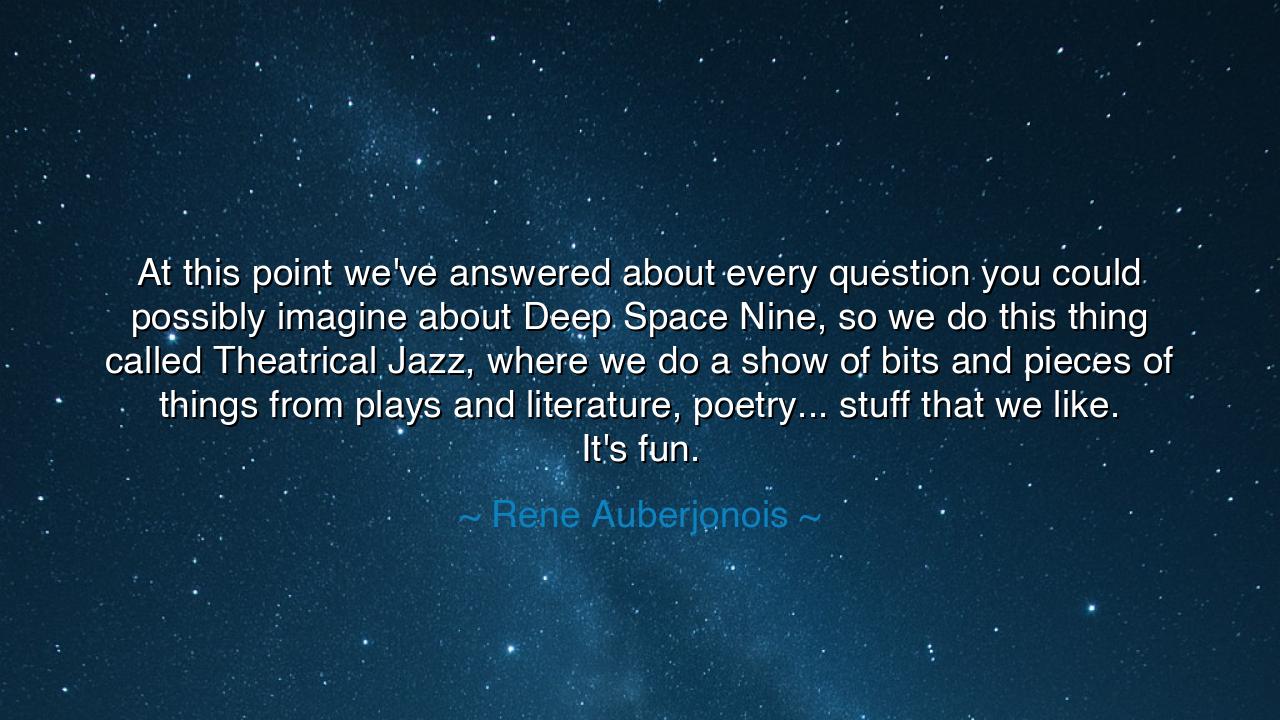
At this point we've answered about every question you could
At this point we've answered about every question you could possibly imagine about Deep Space Nine, so we do this thing called Theatrical Jazz, where we do a show of bits and pieces of things from plays and literature, poetry... stuff that we like. It's fun.






"At this point we’ve answered about every question you could possibly imagine about Deep Space Nine, so we do this thing called Theatrical Jazz, where we do a show of bits and pieces of things from plays and literature, poetry… stuff that we like. It’s fun." Thus spoke Rene Auberjonois, actor and storyteller, whose life was shaped upon the stage and in the hearts of those who watched him. Behind his words lies not only humor, but also wisdom—the truth that when a great work has been spoken of, dissected, and explained until no mystery remains, one must turn to the playfulness of creation, to the joyous weaving of new fragments, to keep the flame alive.
In these words, we hear the echo of the ancients, for they too knew that art cannot live on answers alone. A tragedy of Aeschylus, a chorus of Sophocles, a verse of Sappho—these were not designed to be solved like puzzles, but to be lived, relived, reimagined. So too Auberjonois, having spent his years inside the vast universe of Deep Space Nine, knew that beyond questions and lore lies the living breath of art itself—Theatrical Jazz, the improvisation of the soul, the freedom to take pieces of literature, poetry, plays, and to make from them something fresh and unexpected.
This is not mere diversion. It is a declaration that art must remain alive. When it hardens into mere answers, it becomes stone, admired but unmoving. When it dances, when it surprises, when it mingles high words with laughter and discovery, it becomes once more the song of life. Thus, in Theatrical Jazz, Auberjonois reveals the eternal truth: that art is not only what has been said, but what is being said, here and now, with joy.
Consider the story of the Commedia dell’arte in Renaissance Italy. Its performers carried stock characters and familiar tales, yet their shows were never the same. They improvised with masks, with gestures, with the laughter of the crowd. They took fragments of the familiar and gave them new breath each night. Like Auberjonois, they understood that art’s greatest gift is not to repeat but to renew, not to answer but to awaken. The people, rich and poor alike, found in their performances not mere repetition, but life.
Or recall the legacy of Shakespeare’s players, who sometimes performed before kings and sometimes in raucous taverns. They drew upon words that had already been spoken, yet each time, with a pause, a glance, an improvisation, they transformed them. The power was not only in the text but in the living moment. Auberjonois’s phrase, "bits and pieces… stuff that we like," carries the same timeless insight: that when art is free to play, it is at its most human and most divine.
What lesson, then, do we draw? That in our own lives, we must learn to practice Theatrical Jazz. We must not only seek rigid answers to every question but must also give ourselves to play, to improvisation, to the joy of weaving fragments into something new. For life itself is not a solved riddle but a song, one that must be sung with courage and delight. If we cling only to certainty, we grow dry; if we embrace the dance of creation, we remain alive.
Therefore, O listeners, cultivate this art in your days. Read widely, but do not fear to mix a poem with a memory, a line from scripture with a joke from a friend. Create your own performances of life, drawing from what you love, without shame or hesitation. For in this weaving of fragments, you will find renewal. Truth is not only in the answers—it is in the play.
And remember Rene Auberjonois, who, after the questions had all been asked and answered, turned not to silence but to joy. He teaches us that when the world thinks the story is done, the true artist begins again—not with heaviness, but with laughter, improvisation, and the endless spirit of creation.






AAdministratorAdministrator
Welcome, honored guests. Please leave a comment, we will respond soon